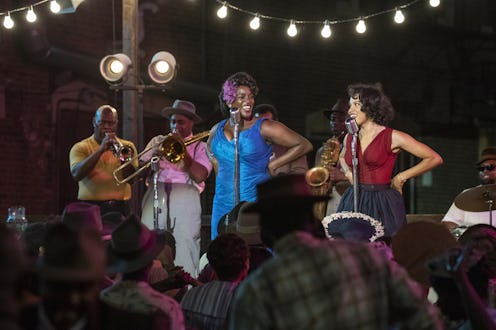TV & Movies
The Lovecraft Country Music Supervisor Breaks Down The Show's Eclectic Soundtrack
The genre-hopping show defies easy categorization.

When asked to describe the vibe of the Lovecraft Country soundtrack, music supervisor Liza Richardson laughs. "Before the show came out, I kept trying to describe it to my mom," she tells Bustle. "It takes place in the '50s, but there's all this modern music, and there's spoken word. It's African American. It's time travel. It's sci-fi horror, and outer space waves."
Lovecraft Country is a show that defies easy categorization. It's just as much about racial terror as it is family drama and Eldritch horror, and the soundtrack reflects that eclecticism, shifting from Etta James' timeless crooning to Tierra Whack's thumping beats before ending on the pensive words of James Baldwin. With guidance from showrunner Misha Green, Richardson uses music to thread together concepts, characters, and emotions, acting as an aural maestro for Frankenstein's monster.
And Richardson has a long history of melding together seemingly disparate sonic elements to create an all-encompassing experience. Her musical career kicked off in the '90s when she began working as a DJ on an experimental KCRW radio show called “Man on the Moon,” which focused on mixing poetry, storytelling, and instrumental music. Her skill at blending together different art forms landed her a music consulting gig on Mark Pellington's PBS series United States of Poetry, which introduced her to the world of music supervision. From there, Richardson widely diversified her portfolio, supervising on the comically tragic Barry, the long-running procedural Hawaii Five-0, and the tension-winding Narcos, among many other projects in her 25-year career.
It's her willingness to always change things up that makes her an integral part of Lovecraft Country, a show where sometimes getting the right sound is all down to "just a gut feeling," Richardson explains. "A lot of people say, 'Why did you choose this song?' And oftentimes the answer is because it just worked. You land on something that just gels or gives you chills ... sometimes there's no intellectual reason. It's just instinct."
This lack of rigidity means that the show's shifts from period-appropriate music to contemporary tracks were based on feel, too. Similarly, production didn't get bogged down when a song they liked didn't end up clearing — a more rock-and-roll version of "Seven Nation Army," for example, or a Beyoncé hit.
And as the music supervisor, Richardson explains that the job isn't always about choosing music and speaking to licensors. Sometimes following your gut means just knowing when a pre-recorded song won't work in a particular scene at all. In Episode 2, for example, they struggled to find the right song for when Tic, Leti, and George first run into the creepy woman guarding the prison tower where they suspect Montrose is being kept. Misha Green wanted something modern, so they put Creedance Clearwater Revival's "Bad Moon Rising" in as a stand-in while they tested various rap and hip hop beats. But everything they attempted "just didn't meld in," Richardson says, and they were similarly hesitant to keep "Bad Moon Rising," a popular tune that's nevertheless been oversampled on other spooky shows like Supernatural, Teen Wolf, andThe Walking Dead.
"We did six or seven rounds" of song attempts, Richardson explained. "When you get past three rounds of trying, it's a sign that this is not a song spot. That's my philosophy." Richardson recommended kicking it over to the score composer, and ultimately the gothic orchestral score is what made it into the final cut instead.
On the flip side, there are countless other moments where one of Richardson's musical choices adds dimension to a scene. Leti and Ruby's diegetic performance of "A Whole Lotta Shakin' Goin' On" sets the stage early for their precarious relationship. In a later episode, a Frank Ocean song plays during a key scene — a get that Richardson's particularly pleased about, since Ocean is famously difficult to clear. And she's ecstatic about the many scenes that use spoken word rather than music, as it harkens back to her KCRW days. As a collector of vinyls that often reference the Civil Rights Era, Richardson brought a huge "vocabulary of cool spoken word pieces" to the table that Green was able to draw from. Though the James Baldwin and "Whitey on the Moon" performances were already scripted by Green when Richardson came on, her collection inspired Green to add in a few more poetry pieces.
Ultimately, being a music supervisor means ensuring that the music further serves the showrunner's vision. Though Richardson gleans information from reading Green's scripts first, it's seeing the finished scenes that really brings ideas bubbling to the surface. "There's subtleties, there's levels of humor, levels of irony, levels of satire that you want to achieve. Songs react to that, and sometimes you can only see that when you're looking at picture." And if the song choices end up being as varied and unique as they come? Well, then it all feeds back into Lovecraft Country feeling like a vibrant, ever-changing piece of art, full of historical speeches, modern beats, and classic period tunes that truly sing under Green and Richardson's collaboration.